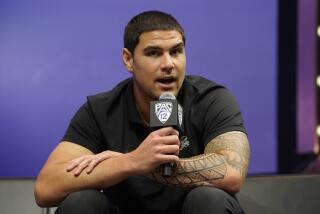Renegades No Longer, Miami Players Try to Be Nice Guys
- Share via
MIAMI — You probably won’t see the second-ranked Miami Hurricanes wiggling their posteriors anytime soon. No jiggling. No dancing. No taunting or talking trash. These are the new Hurricanes. The image-conscious Hurricanes. Saying bad things about the other guys and their relations is no longer tolerated.
The effort to reshape perceptions about the University of Miami, one of the most talented teams in the nation and part of a Florida trio of college teams that dot the top 20, is led by Coach Dennis Erickson, who is concerned about what people think about his players when they leave college and enter what he calls “the real world.”
“The biggest thing is that people thought we were hoodlums and thugs,” said Erickson. “That was really unfair to our players. When a player left here, and wasn’t drafted or didn’t go to the NFL and went out to get a normal job, I thought people would label our kids. They would be unfairly labeled as goons and have difficulty in the real world. Perception is something that is out there.”
Said wide receiver Lamar Thomas: “We want to be thought of as the good guys. We’ll let the teams like Houston (a 40-10 loser to Miami) do all the trash talking and strutting, then we’ll just come in and kick their butts, like we did.”
So no more stepping off the plane wearing Army fatigues as Miami players did under then Coach Jimmy Johnson in the 1986 Fiesta Bowl. No more rubbing the noses of University of Texas players in the dirt during a 46-3 romp in last January’s Cotton Bowl.
Miami should take responsibility for its past actions, of course. But the Hurricanes feel they have been picked on at times.
Most of this begins with the Cotton Bowl. The Hurricanes received criticism from every corner of the country for their actions in that game. Miami had 16 penalties for 202 yards, some of those for unsportsmanlike conduct.
One scene sticks out in the minds of many: Wide receiver Randal Hill, now in the NFL, dancing alone in the tunnel near the stadium for about 30 seconds after scoring a touchdown. Basically, Miami humiliated the Longhorns on and off the field. “I guess the Cotton Bowl was the straw that broke the camel’s back,” said Erickson.
But showboating is not something limited to the Hurricanes. University of Tennessee players do it. Florida State players do it. Southern California players did a little dancing in their upset of Penn State this season.
Officials, though, are watching Miami players. The NCAA sent out a video to its member schools of 37 plays defining what will and won’t be accepted under the new rules. Unfairly, Miami says, the first dozen examples of violations involved Miami players.
“Before the NCAA even came out with any rules, there was a certain faction of players left over from a different era that felt that’s how we had to play to be successful,” said Erickson. “So we had to change that.
“Regardless, I think the tape itself was completely out of line. That was very unfair. The tape was done by the rules committee and guys that are supposed to have class, and that was one of the most classless things ever done.”
Thomas remembers how upset Erickson was after the Cotton Bowl game. “He was under so much pressure after the Cotton Bowl,” Thomas said. “You could see it in his face. The headlines weren’t ‘Miami beats Texas.’ The headlines were ‘Miami, those thugs.’ After the game, nobody talked about how Texas was talking all the trash. They were talking trash before and during the game.
“The only time they stopped was after the game, after they got ... whipped. After that ... those people down in Texas had to look for something else to look at ... , so they brought up all this stuff about the way we acted. Most of that stuff came out of Texas.”
Erickson has told his team that if sees any Cotton Bowl-like performances from a player this season he’ll yank him. “I wouldn’t want to come back to the sideline after a penalty like that,” said Thomas. “Coach would probably sit you down for a while and let you think about what you did.”
More to Read
Go beyond the scoreboard
Get the latest on L.A.'s teams in the daily Sports Report newsletter.
You may occasionally receive promotional content from the Los Angeles Times.









